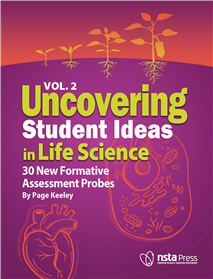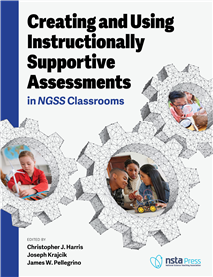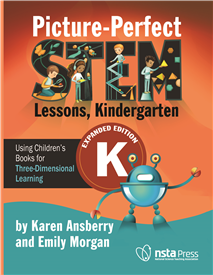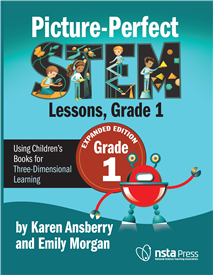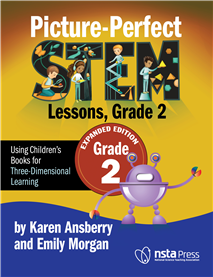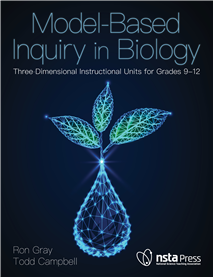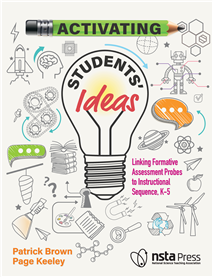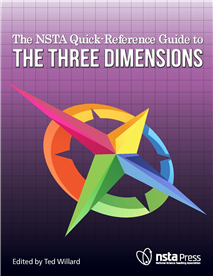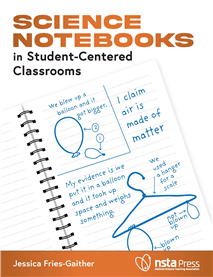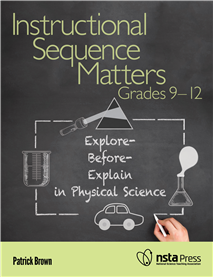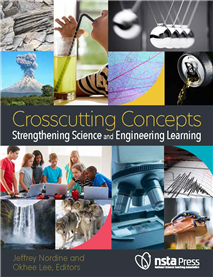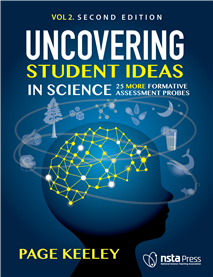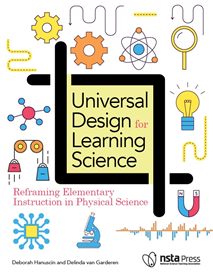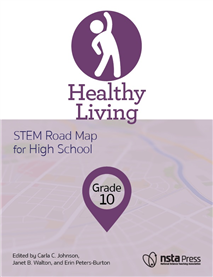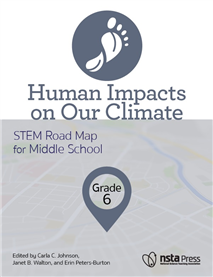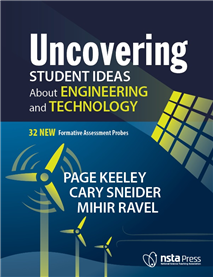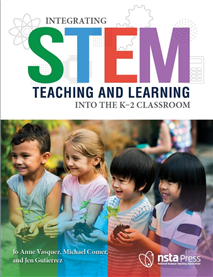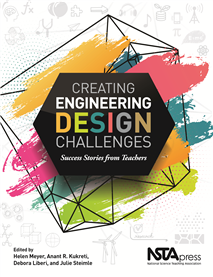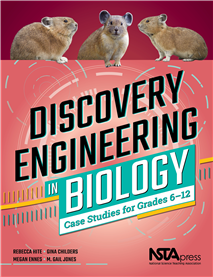All Book Chapters
Book Chapter
There’s a lot to love about this newly expanded book in the Picture-Perfect Science series: You can combine STEM and reading through lively lessons that are just right for your kindergarten students. Also, reading-comprehension strategies are embed...
Book Chapter
There’s a lot to love about this newly expanded book in the Picture-Perfect Science series: You can combine STEM and reading through lively lessons that are just right for your first-grade students. Also, reading-comprehension strategies are embedd...
Book Chapter
Leadership by and for Science Teachers (Book Sample)
Imagine having the opportunity to hear from 21 colleagues about their personal leadership journeys—and to get their advice. Leadership by and for Science Teachers is just such an opportunity. Author Rodger Bybee provides the insights and inspiratio...
Book Chapter
There’s a lot to love about this newly expanded book in the Picture-Perfect Science series: You can combine STEM and reading through appealing lessons that are just right for your second-grade students. Also, reading comprehension strategies are ...
Book Chapter
Model-Based Inquiry in Biology: Three-Dimensional Instructional Units for Grades 9-12 (Book Sample)
This book is your chance to shift the emphasis of your high school biology curriculum away from “we need to learn about this topic in order to do well in class” to “we need to figure out why or how things happen in the world.” Using the book�...
Book Chapter
AVAILABLE FOR PREORDER! COMING IN MARCH! Science teachers face an incredible challenging task of combining research on how students learn best, the three-dimensions of the Science Education Frameworks that in themselves are complicated to understa...
Book Chapter
The NSTA Quick-Reference Guide to the Three Dimensions (Book Sample)
NOW AVAILABLE FOR PREORDER (BOOKS TO SHIP LATE JULY) Since its release in 2014, the NSTA Quick-Reference Guide has become an essential tool for educators across the country to explore the complex structure of three-dimensional standards, including...
Book Chapter
Instructional Sequence Matters, Grades 9–12 is the one-stop resource that will inspire you to reimagine your approach to high school physical science. The book discusses the 5E (Engage, Explore, Explain, Elaborate, and Evaluate) as a specific pathw...
Book Chapter
Crosscutting Concepts: Strengthening Science and Engineering Learning (Book Sample)
Maybe you have a good grasp of disciplinary core ideas and science and engineering practices—critical parts of the Next Generation Science Standards—but you are looking for more resources about integrating crosscutting concepts (CCCs). Or maybe y...
Book Chapter
COMING IN APRIL 2021; NOW AVAILABLE FOR PREORDER “Leave no alternative science idea unchallenged!” could be the slogan of this second edition of Uncovering Student Ideas in Science, Volume 2. Like the others in the bestselling series, this boo...
Book Chapter
Here’s good news: With this practical book, you can learn from experienced elementary school educators about how to make physical science both challenging and accessible for a diverse range of students. Written by teachers for teachers, Universal D...
Book Chapter
Novel Engineering, K–8: An Integrated Approach to Engineering and Literacy (Book Sample)
With the Novel Engineering approach, “students become excited about what they are reading, writing, designing, and building! This excitement in turn helps them make strides in engineering and literacy, as well as in their abilities to work together...
Book Chapter
Healthy Living, Grade 10: STEM Road Map for High School (Book Sample)
What if you could challenge your 10th graders to develop a product or process that helps people embrace diet and exercise and has a positive impact on society? With this volume in the STEM Road Map Curriculum Series, you can! Healthy Living outlin...
Book Chapter
Human Impacts on Our Climate, Grade 6: STEM Road Map for Middle School (Book Sample)
What if you could challenge your sixth graders to come up with a way to help tackle climate change in their own community? With this volume in the STEM Road Map Curriculum Series, you can! Human Impacts on Our Climate outlines a journey that will ...
Book Chapter
The Changing Earth, Grade 8: STEM Road Map for Middle School (Book Sample)
Download and read a sample chapter from this book to learn more.What if you could challenge your eighth graders to help people recognize the inherent risks of living in a region that’s prone to flooding, earthquakes, and volcanoes? With this volum...
Book Chapter
Have you been wondering how well your students understand engineering and technology concepts? Have you been wishing for formative assessment tools in both English and Spanish? If so, this is the book for you. Like the other 11 books in the bests...
Book Chapter
Integrating STEM Teaching and Learning Into the K–2 Classroom (Book Sample)
“Integrating STEM Teaching and Learning Into the K–2 Classroom is a critically important contribution toward advancing STEM teaching and learning. It blazes a trail for early elementary classroom practitioners to reflect the latest thinking in ST...
Book Chapter
STEM, Standards, and Strategies for High-Quality Units (Book Sample)
Download and read a sample chapter from this book to learn more.Do you, your school, or your school district want to align your science curriculum with state standards while meeting the growing demand for STEM instruction? If so, this is the book for...
Book Chapter
Chapters 1–3 provide background information and introduce the particular engineering design process (EDP) used in the Cincinnati Engineering Enhanced Math and Science (CEEMS) program, as well as how the design challenge unit framework connects with...
Book Chapter
Design Challenge Units and Research on Learning
Chapters 1–3 provide background information and introduce the particular engineering design process (EDP) used in the Cincinnati Engineering Enhanced Math and Science (CEEMS) program, as well as how the design challenge unit framework connects with...
Book Chapter
Defining and Using Our Design Challenge Units
Chapters 1–3 provide background information and introduce the particular engineering design process (EDP) used in the Cincinnati Engineering Enhanced Math and Science (CEEMS) program, as well as how the design challenge unit framework connects with...
Book Chapter
Setting the Stage: Create Hooks to Secure Student Buy-In
Chapters 4–7 contain sections written by individual secondary math and science teachers (grades 6-12) who focus on different aspects of implementing design challenge units. In this chapter, the teachers’ stories capture the excitement of engaging...
Book Chapter
Focusing on the Engineering Design Process
Chapters 4–7 contain sections written by individual secondary math and science teachers (grades 6-12) who focus on different aspects of implementing design challenge units. In this chapter, the three teachers detail the teaching strategies they use...
Book Chapter
Integrating Assessment Into Design Challenge Units
Chapters 4–7 contain sections written by individual secondary math and science teachers (grades 6-12) who focus on different aspects of implementing design challenge units. In this chapter, the three teachers identify the appropriate content that w...
Book Chapter
Developing 21st-Century Skills With Design Challenge Units
Chapters 4–7 contain sections written by individual secondary math and science teachers (grades 6-12) who focus on different aspects of implementing design challenge units. In this chapter, the teachers recognize the needs of students and develop i...
Book Chapter
Getting Started With Design Challenge Units
This chapter demonstrates how to modify another teacher’s design challenge for your own classroom and how to reflect on and improve your own units after implementation. It also shares resources for finding design challenge unit ideas, finding techn...
Book Chapter
This chapter presents a case study on Controlling Mosquitoes to Stem Malaria Infection using the discovery engineering process. In the lesson, students learn how scientists discovered the way in which malaria spreads. Students review malaria infecti...
Book Chapter
This chapter presents a case study on John Snow’s Research Into the Cause and Spread of Cholera using the discovery engineering process. In the lesson, students explore the 1854 cholera outbreak in London and analyze the work done by Dr. John Snow...
Book Chapter
This chapter presents a case study on thalidomide Hidden Tragedy and Second Chances using the discovery engineering process. In the lesson, students explore the history of thalidomide, a drug with side effects that caused serious congenital deformi...
Book Chapter
This chapter presents a case study on Using Biological Mechanisms to Treat Diseases and Disorders using the discovery engineering process. In this lesson, students read a case study about scientists who discovered a way to use snake venom in the diag...
Book Chapter
This chapter presents a case study on The Discovery of Dangerous Drug Interactions using the discovery engineering process. In this lesson, students read a case study on the discovery of the adverse effect of combining grapefruit with certain medi...
Book Chapter
This chapter presents a case study on The Accidental Discovery of the Pacemaker using the discovery engineering process. In this lesson, students explore the development of the pacemaker and discover that some heart conditions are controlled with ...
Book Chapter
This chapter presents a case study on Treating Anaphylaxis Due to Allergies using the discovery engineering process. In this lesson, students explore the discovery of anaphylaxis response due to overexposure of allergens. The discovery of this phenom...
Book Chapter
This chapter presents a case study on Combating Chronic Alcohol Abuse using the discovery engineering process. In this lesson, students explore the discovery of Antabuse as a drug treatment for individuals with chronic alcoholism. Students review Ce...
Book Chapter
This chapter presents a case study on Understanding Environmental Impacts on Species using the discovery engineering process. The case study focuses on the pika, a mammal related to the rabbit, and how, although pika are very sensitive to heat, a g...
Book Chapter
Seeing the Earth Glow From Space
This chapter presents a case study on Plants That Glow using the discovery engineering process. In this lesson, students explore the process of fluorescence and learn how this light can be used to monitor the health of large numbers of plants. They ...
Book Chapter
This chapter presents a case study on Algal Biofuels using the discovery engineering process. In this lesson, students learn about the discovery of algae as a biofuel. They build algae skimmers to capture algae and analyze it under a microscope. Aft...



